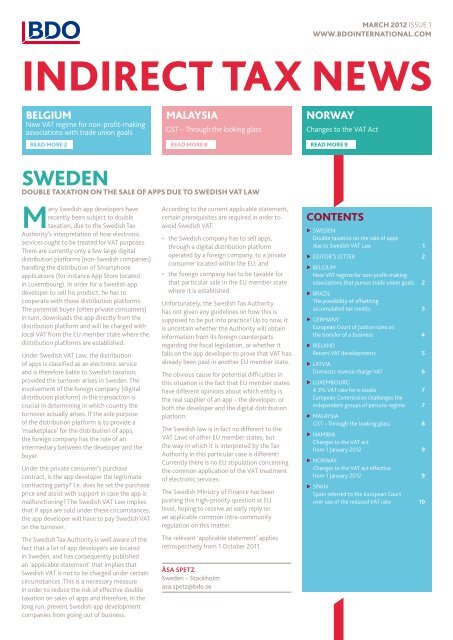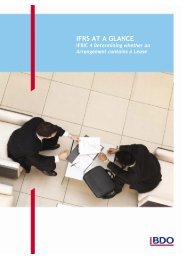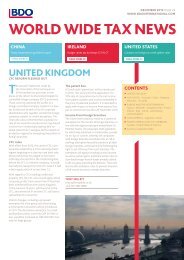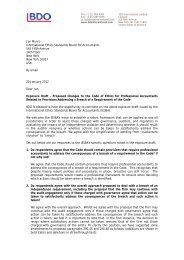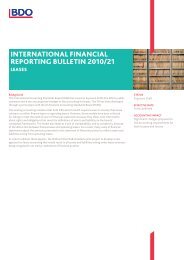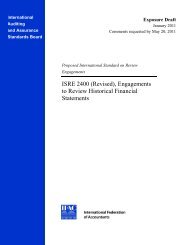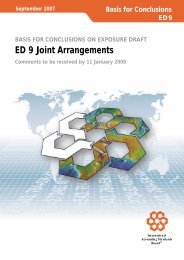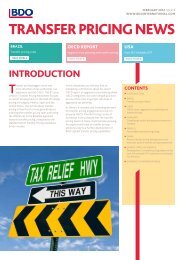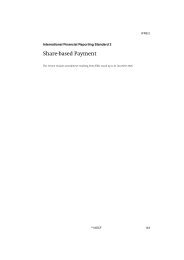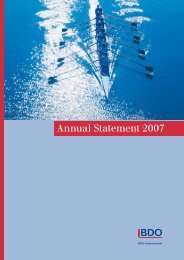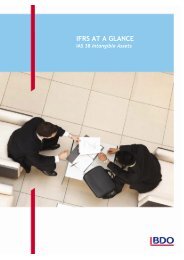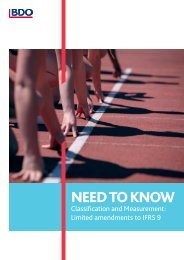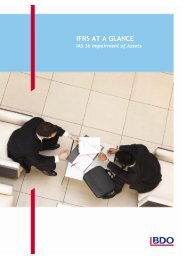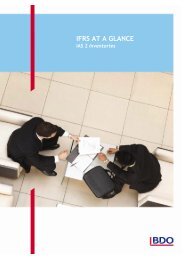Indirect Tax News 1 - March 2012 - BDO International
Indirect Tax News 1 - March 2012 - BDO International
Indirect Tax News 1 - March 2012 - BDO International
Create successful ePaper yourself
Turn your PDF publications into a flip-book with our unique Google optimized e-Paper software.
MARCH <strong>2012</strong> Issue 1<br />
www.bdoINTERNATIONAL.COM<br />
indirect tax NEWS<br />
BELGIUM<br />
New VAT regime for non-profit-making<br />
associations with trade union goals<br />
READ MORE 2<br />
MALAYSIA<br />
GST – Through the looking glass<br />
READ MORE 8<br />
NORWAY<br />
Changes to the VAT Act<br />
READ MORE 9<br />
SWEDEN<br />
DOUBLE TAXATION ON THE SALE OF APPS DUE TO SWEDISH VAT LAW<br />
Many Swedish app developers have<br />
recently been subject to double<br />
taxation, due to the Swedish <strong>Tax</strong><br />
Authority’s interpretation of how electronic<br />
services ought to be treated for VAT purposes.<br />
There are currently only a few large digital<br />
distribution platforms (non-Swedish companies)<br />
handling the distribution of Smartphone<br />
applications (for instance App Store located<br />
in Luxembourg). In order for a Swedish app<br />
developer to sell his product, he has to<br />
cooperate with those distribution platforms.<br />
The potential buyer (often private consumers)<br />
in turn, downloads the app directly from the<br />
distribution platform and will be charged with<br />
local VAT from the EU member state where the<br />
distribution platforms are established.<br />
Under Swedish VAT Law, the distribution<br />
of apps is classified as an electronic service<br />
and is therefore liable to Swedish taxation,<br />
provided the turnover arises in Sweden. The<br />
involvement of the foreign company (digital<br />
distribution platform) in the transaction is<br />
crucial in determining in which country the<br />
turnover actually arises. If the sole purpose<br />
of the distribution platform is to provide a<br />
‘marketplace’ for the distribution of apps,<br />
the foreign company has the role of an<br />
intermediary between the developer and the<br />
buyer.<br />
Under the private consumer‘s purchase<br />
contract, is the app developer the legitimate<br />
contracting party? I.e. does he set the purchase<br />
price and assist with support in case the app is<br />
malfunctioning? The Swedish VAT Law implies<br />
that if apps are sold under these circumstances,<br />
the app developer will have to pay Swedish VAT<br />
on the turnover.<br />
The Swedish <strong>Tax</strong> Authority is well aware of the<br />
fact that a lot of app developers are located<br />
in Sweden, and has consequently published<br />
an ‘applicable statement’ that implies that<br />
Swedish VAT is not to be charged under certain<br />
circumstances. This is a necessary measure<br />
in order to reduce the risk of effective double<br />
taxation on sales of apps and therefore, in the<br />
long run, prevent Swedish app development<br />
companies from going out of business.<br />
According to the current applicable statement,<br />
certain prerequisites are required in order to<br />
avoid Swedish VAT:<br />
• the Swedish company has to sell apps,<br />
through a digital distribution platform<br />
operated by a foreign company, to a private<br />
consumer located within the EU; and<br />
• the foreign company has to be taxable for<br />
that particular sale in the EU member state<br />
where it is established.<br />
Unfortunately, the Swedish <strong>Tax</strong> Authority<br />
has not given any guidelines on how this is<br />
supposed to be put into practice! Up to now, it<br />
is uncertain whether the Authority will obtain<br />
information from its foreign counterparts<br />
regarding the fiscal legislation, or whether it<br />
falls on the app developer to prove that VAT has<br />
already been paid in another EU member state.<br />
The obvious cause for potential difficulties in<br />
this situation is the fact that EU member states<br />
have different opinions about which entity is<br />
the real supplier of an app – the developer, or<br />
both the developer and the digital distribution<br />
platform.<br />
The Swedish law is in fact no different to the<br />
VAT Laws of other EU member states, but<br />
the way in which it is interpreted by the <strong>Tax</strong><br />
Authority in this particular case is different!<br />
Currently there is no EU stipulation concerning<br />
the common application of the VAT treatment<br />
of electronic services.<br />
The Swedish Ministry of Finance has been<br />
pushing this high-priority question at EU<br />
level, hoping to receive an early reply on<br />
an applicable common intra-community<br />
regulation on this matter.<br />
The relevant ‘applicable statement’ applies<br />
retrospectively from 1 October 2011.<br />
ÅSA SPETZ<br />
Sweden – Stockholm<br />
asa.spetz@bdo.se<br />
Contents<br />
▶▶SWEDEN<br />
Double taxation on the sale of apps<br />
due to Swedish VAT Law 1<br />
▶▶EDITOR’S LETTER 2<br />
▶▶BELGIUM<br />
New VAT regime for non-profit-making<br />
associations that pursue trade union goals 2<br />
▶▶BRAZIL<br />
The possibility of offsetting<br />
accumulated tax credits 3<br />
▶▶GERMANY<br />
European Court of Justice rules on<br />
the transfer of a business 4<br />
▶▶IRELAND<br />
Recent VAT developments 5<br />
▶▶LATVIA<br />
Domestic reverse charge VAT 6<br />
▶▶LUXEMBOURG<br />
A 3% VAT rate for e-books 7<br />
European Commission challenges the<br />
independent groups of persons regime 7<br />
▶▶MALAYSIA<br />
GST – Through the looking glass 8<br />
▶▶NAMIBIA<br />
Changes to the VAT act<br />
from 1 January <strong>2012</strong> 9<br />
▶▶NORWAY<br />
Changes to the VAT act effective<br />
from 1 January <strong>2012</strong> 9<br />
▶▶SPAIN<br />
Spain referred to the European Court<br />
over use of the reduced VAT rate 10
2 INDIRECT TAX NEWS 1<br />
Editor’s<br />
Letter<br />
Dear Readers,<br />
As the new Chair of the <strong>BDO</strong><br />
international VAT Centre of<br />
Excellence (VCOE), I am pleased to<br />
introduce the first edition of <strong>BDO</strong> <strong>Indirect</strong><br />
<strong>Tax</strong> <strong>News</strong> for <strong>2012</strong>.<br />
Heading into <strong>2012</strong>, the good news is that<br />
the strength of the <strong>Indirect</strong> <strong>Tax</strong> advisor<br />
network within <strong>BDO</strong> continues to grow,<br />
and my colleagues and I on the VCOE<br />
Committee are continually using our best<br />
endeavours to ensure that the Firm is well<br />
placed to provide our clients and contacts<br />
with any assistance they may require with<br />
future compliance and advisory matters.<br />
As you are aware, indirect taxes are<br />
significant generators of revenue for<br />
governments across the globe, and it<br />
is interesting to note that the austerity<br />
measures being introduced in the wake of<br />
the economic crisis are heavily focused on<br />
increasing VAT rates, particularly within the<br />
European Union.<br />
In the circumstances we need to remain<br />
mindful of the shift from direct to<br />
indirect taxation, and the challenges and<br />
opportunities which this presents.<br />
I hope you find this publication both useful<br />
and informative. The VAT specialist of your<br />
<strong>BDO</strong> Member Firm will be pleased to advise<br />
if further information on a specific issue is<br />
needed.<br />
Kind regards from Dublin.<br />
IVOR FEERICK<br />
Chair of the <strong>BDO</strong> international VAT Centre<br />
of Excellence<br />
Ireland – Dublin<br />
ifeerick@bdo.ie<br />
BELGIUM<br />
NEW VAT REGIME FOR NON-PROFIT-MAKING ASSOCIATIONS<br />
THAT PURSUE TRADE UNION GOALS<br />
The Belgian VAT Authorities recently<br />
issued a circular letter (No. ET 121.844<br />
of 3 January <strong>2012</strong>) that provides<br />
clarification on the scope of the VAT exemption<br />
regarding membership fees paid to a nonprofit-making<br />
association. In accordance<br />
with European case law (Court of Justice of<br />
the European Union (CJEU) case C-149/97,<br />
Institute of the Motor Industry), this exemption<br />
is applicable to the total amount of the<br />
membership fees when the main objective of<br />
the association is the pursuit of trade union<br />
goals.<br />
By virtue of article 132, 1, (l) of the Council<br />
Directive 2006/112/EC, the supply by nonprofit-making<br />
organisations of services<br />
consisting of the defence of common interests<br />
of members, and representation of them<br />
towards third parties (i.e. trade union/lobbying<br />
services), in return for a subscription fixed in<br />
accordance with the articles of association,<br />
is exempt from VAT. However, it happens<br />
that these organisations (as part of the<br />
subscription) render some “individualised”<br />
services to their members (general<br />
promotional activities, advice, participation<br />
in events, etc.) in addition to the trade union/<br />
lobbying services. The new circular mainly<br />
comments on whether the above mentioned<br />
VAT exemption also applies to these additional<br />
“individualised” services.<br />
In the past, the Belgian VAT authorities<br />
allowed a split of the subscription between<br />
the part that covers the trade union/lobbying<br />
services and the one that covers the other<br />
activities. The first part was VAT-exempt (and<br />
did not give any entitlement to deduct input<br />
VAT) whereas the second part was in principle<br />
subject to VAT (and thus gave an entitlement<br />
to deduct input VAT). On this basis, the<br />
organisation had the status of mixed taxable<br />
person. In some cases, the apportionment was<br />
fixed by the VAT Authorities through a specific<br />
decision (which could give organisations with<br />
a trade union nature an entitlement to input<br />
VAT deduction of over 80%).<br />
According to the new circular, there will, in<br />
principle, be only two possible scenarios:<br />
• the main objective of the association is of<br />
a trade union/lobbying nature. In this case,<br />
the exemption will apply to all activities<br />
performed in return for a subscription<br />
fixed in accordance with the articles of<br />
association (i.e. a membership fee), including<br />
“individualised” services – they would be<br />
considered as ancillary to the trade union/<br />
lobbying services, but covered by such<br />
membership fees. In this case, the association<br />
will be treated as a VAT-exempt taxable<br />
person without any entitlement to deduct<br />
input VAT; or<br />
• the main objective of the association is<br />
not of a trade union/lobbying nature. In<br />
this case, VAT will apply to all activities<br />
covered by the membership fees, including<br />
trade union/lobbying activities that would<br />
be considered as ancillary. In this case, the<br />
association will be treated as a taxable<br />
person with full entitlement to deduct input<br />
VAT.<br />
In other words, it is now a case of ‘all or<br />
nothing’ with regard to the activities covered<br />
by membership fees. Either they will be fully<br />
subject to VAT or they will be fully exempt.<br />
However, if it is not possible to determine the<br />
main objective, a split (as in the past) could<br />
still be affected (in principle 50% lobbying and<br />
50% other services).<br />
Supplies made to all or part of the<br />
membership in return for a charge separate<br />
from the membership fees should always<br />
follow their own VAT treatment and are not<br />
covered by the exemption for trade union/<br />
lobbying activities. It is thus still possible that<br />
an association qualifies as a mixed taxable<br />
person, with partial entitlement to input VAT<br />
deduction.
INDIRECT TAX NEWS 1<br />
BRAZIL<br />
THE POSSIBILITY OF OFFSETTING ACCUMULATED TAX CREDITS<br />
3<br />
In addition, in the event of a change to<br />
their input VAT deduction entitlement,<br />
the organisation must/can normally revise<br />
the input VAT related to investment goods<br />
acquired within the last 5 years (for movable<br />
goods or immovable work) or within 15 years<br />
(immovable goods) with effect for <strong>2012</strong> and<br />
the remaining years of the applicable revision<br />
period.<br />
We note also that, in the event of an<br />
improvement to the input VAT deduction<br />
entitlement of an organisation (based on the<br />
new circular), it could even be argued that<br />
the organisation would have an entitlement<br />
to input VAT recovery of all input VAT paid<br />
since 1 January 2009 (on normal costs<br />
and investment goods), as the current<br />
administrative circular is only the confirmation<br />
of an existing interpretation of the European<br />
VAT legislation by the CJEU. However, this<br />
would imply the need for a regularisation<br />
of invoices issued in the past, which may<br />
not be beneficial for the organisation (and/<br />
or the members). On the other hand, the<br />
Belgian VAT Authorities have confirmed in the<br />
aforementioned circular that they would not<br />
claim any VAT for the past.<br />
This new circular came into force on<br />
1 January <strong>2012</strong>. It cancels and replaces all<br />
previous administrative commentaries.<br />
<strong>International</strong> associations should therefore<br />
review their VAT situation depending on the<br />
nature of their main objective.<br />
Finally, we note that a change in the VAT<br />
status of an organisation does not necessarily<br />
imply a change in its status for income tax<br />
purposes. However, an (in-depth) analysis of<br />
this aspect could be advisable, especially if<br />
the application of the new rules significantly<br />
changes the VAT status of the organisation.<br />
Erwin Boumans<br />
JEAN-CLAUDE SEMUCYO<br />
Belgium – Brussels<br />
erwin.boumans@bdo.be<br />
jean-claude.semucyo@bdo.be<br />
In general terms, Brazil’s legal system allows<br />
the taxation of certain business operations<br />
when these involve a taxable event which<br />
creates a tax liability.<br />
Among the various tax rules established<br />
by Brazilian law, the principle of noncumulativeness<br />
stands out. According to this<br />
principle, it is possible to deduct from the tax<br />
levied on the shipment of goods, tax amounts<br />
already paid in previous transactions referring<br />
to the same goods or to the raw materials<br />
required for their manufacturing.<br />
The ICMS (State VAT) is an example of a<br />
tax subject to this principle. Most Brazilian<br />
companies encounter this tax.<br />
Certain companies end up generating an<br />
accumulated credit as a result of not offsetting<br />
credits wholly or partly against debts in nontaxable<br />
shipments. These shipments occur for<br />
different reasons, among which exports stand<br />
out.<br />
In particular, the accumulated credit can<br />
be used both to settle tax debts with the<br />
State and to transfer the credit to a different<br />
establishment of the same company,<br />
supplier, service provider or other companies<br />
recognised by the Finance State Department.<br />
With proper tax planning, it is therefore<br />
quite possible for companies which are fully<br />
active in Brazil to offset accumulated tax<br />
credits, subject to compliance with the legal<br />
requirements. This would certainly increase<br />
business profitability and reduce the tax<br />
burden.<br />
RAFAEL LEITE<br />
JIVAGO ALMEIDA<br />
WAGNER BASTOS<br />
Brazil – São Paulo<br />
rafael.leite@bdobrazil.com.br<br />
jivago.almeida@bdobrazil.com.br<br />
wagner.bastos@bdobrazil.com.br
4 INDIRECT TAX NEWS 1<br />
GERMANY<br />
EUROPEAN COURT OF JUSTICE RULES ON THE TRANSFER OF A BUSINESS<br />
On 10 November 2011, the European<br />
Court of Justice (CJEU) gave its ruling<br />
in the Christel Schriever v Finanzamt<br />
Lüdenscheid case (number C-444-10). The<br />
question for the Court to decide was whether<br />
there had been a non-taxable transfer of an<br />
entire business where the vendor retained<br />
the business premises and leased them to the<br />
purchaser.<br />
Background<br />
Until 30 June 1996, the complainant Christel<br />
Schriever had run a retail sports equipment<br />
business in business premises belonging to her.<br />
On that date, Ms. Schriever sold the stock and<br />
shop installations to Sport S. GmbH for a total<br />
amount of DEM 455,000, with no VAT being<br />
shown on the related invoice. Ms. Schriever<br />
then leased the shop premises to Sport S.<br />
GmbH from 1 August 1996 for an indefinite<br />
period, subject to a quarterly period of notice<br />
by either party. Sport S. GmbH continued to<br />
run the sports shop until 31 May 1998.<br />
Ms. Schriever treated the sale of the stock<br />
and fittings as a non-taxable transfer of an<br />
entire business according to paragraph 1 (1a)<br />
of the German VAT Act. The German tax<br />
authorities refused to grant this treatment to<br />
Ms. Schriever due to the fact that the business<br />
premises, as an essential element, were not<br />
sold to Sport S. GmbH. However, the local<br />
fiscal court confirmed the treatment of a nontaxable<br />
transfer of an entire business, as the<br />
totality of assets had been sold to Sport S.<br />
GmbH, and Sport S. GmbH had actually<br />
continued to run the business. The mere<br />
theoretical possibility of being able to give<br />
notice on the lease agreement at any time was<br />
of no consequence in this regard.<br />
This led to the reference for a preliminary<br />
ruling from the German Federal Fiscal Court.<br />
Questions referred<br />
1. Is there a “transfer” of a totality of assets<br />
within the meaning of the Sixth Directive,<br />
where a trader transfers the stock and<br />
fittings of his retail outlet to a purchaser<br />
and merely leases the premises which he<br />
owns to the purchaser?<br />
2. Is it relevant in that regard whether the<br />
premises were leased on the basis of a<br />
long-term lease contract, or whether the<br />
lease contract is for an indefinite period<br />
and may be terminated by either party at<br />
short notice?<br />
CJEU judgment<br />
According to the CJEU, a non-taxable transfer<br />
of the totality of business assets for the<br />
purposes of the Sixth Directive requires that<br />
the purchaser is able to continue the business<br />
as an independent economic undertaking.<br />
However, the mere sale of stock is not<br />
sufficient to satisfy this requirement. To<br />
determine whether the transaction at issue<br />
can be regarded as a transfer of a totality of<br />
assets, an overall assessment of the factual<br />
circumstances has to be made, subject to the<br />
following distinctions:<br />
(1) If an economic activity does not require<br />
the use of particular premises or any<br />
premises with a fixed shop installation<br />
that would be needed for continuing the<br />
economic activity, then the totality of the<br />
assets can be transferred even without the<br />
transfer of the business premises.<br />
(2) However, if the purchaser can only<br />
continue the economic activity by using<br />
the same premises as were used by the<br />
vendor, then a transfer of the totality of<br />
assets would at least require the purchaser<br />
to obtain possession of the business<br />
premises.<br />
(3) The possession of the business premises<br />
does not necessarily require the transfer<br />
of the premises. A transfer of assets may<br />
also equally take place if the business<br />
premises are made available to the<br />
purchaser by means of a lease contract, or<br />
if the purchaser has their own appropriate<br />
premises to which all of the transferred<br />
goods can be moved and where the<br />
purchaser can carry on the respective<br />
economic activity.<br />
(4) If the continuation of the economic<br />
activity requires the purchaser to use the<br />
same premises as the vendor did, the CJEU<br />
raises no objections if the possession of<br />
the premises is transferred by means of<br />
a lease contract. In this connection, it is<br />
irrelevant whether the lease contract is<br />
indefinite and can be terminated at short<br />
notice by either party. It is solely decisive<br />
whether the lease contract terms are an<br />
obstacle to the long-term continuation of<br />
the economic activity of the purchaser.<br />
Following the above-mentioned<br />
considerations, the CJEU concluded that a<br />
non-taxable transfer of the totality of business<br />
assets had taken place, as Sport S. GmbH<br />
continued the acquired business for nearly two<br />
years, and did not just liquidate the business<br />
activity immediately after the purchase.<br />
Practical impact of the judgment<br />
A non-taxable transfer of the totality of<br />
business assets can apply even in cases where<br />
substantial parts of the business are retained.<br />
However, the purchaser must be able to<br />
continue the business as an independent<br />
economic undertaking.<br />
An issue which still remains unexplained<br />
within the present CJEU judgment is the<br />
question of whether a non-taxable transfer of<br />
the totality of business assets applies even if<br />
the business premises are sold to a third party<br />
who then enters into a lease contract for the<br />
business premises with the purchaser.<br />
ANNETTE POGODDA<br />
CLAUS WAGNER<br />
Germany – Berlin<br />
annette.pogodda@bdo.de<br />
claus.wagner@bdo.de
IRELAND<br />
RECENT VAT DEVELOPMENTS<br />
INDIRECT TAX NEWS 1<br />
5<br />
With effect from 1 January <strong>2012</strong> the<br />
standard rate of VAT applicable in<br />
Ireland has increased from 21% to<br />
23%.<br />
Whereas the reduced rate of VAT is still 13.5%,<br />
a temporary reduced VAT rate of 9% was<br />
introduced with effect from 1 July 2011 with a<br />
view to stimulating the Irish economy.<br />
9% Rate<br />
The 9% rate applies to certain goods and<br />
services which were previously liable at the<br />
reduced 13.5% rate, although the 13.5% rate<br />
continues to apply to other items. The supplies<br />
liable at the 9% VAT rate include the following:<br />
• restaurant and catering services;<br />
• hotel and holiday accommodation;<br />
• admissions to:<br />
• cinemas, theatres and certain musical<br />
performances;<br />
• museums and art gallery exhibitions;<br />
• pet farms; and<br />
• fairgrounds or amusement park services;<br />
• the provision of facilities for taking part in<br />
sport;<br />
• hairdressing services; and<br />
• printed matter such as brochures, maps,<br />
programs, leaflets, catalogues and<br />
newspapers.<br />
It is intended that the VAT rate applying to<br />
these goods and services will revert to 13.5%<br />
with effect from 1 January 2014.<br />
13.5% Rate<br />
The following items continue to remain liable<br />
to Irish VAT at the 13.5% rate:<br />
• bakery products, excluding bread (bread<br />
related products qualifying for 0% are<br />
specially defined);<br />
• residential property;<br />
• building services related to residential<br />
property, including installation;<br />
• routine cleaning of residential property;<br />
• minor repairs of bicycles, shoes or leather<br />
goods, clothing or household linen;<br />
• non-oral contraceptive products;<br />
• goods used for the agricultural production<br />
of bio-fuel;<br />
• agricultural services;<br />
• certain nursery or garden centre stock;<br />
• animal insemination services and livestock<br />
semen;<br />
• children’s car safety seats;<br />
• waste acceptance and disposal services;<br />
• greyhound feeding stuff and live poultry and<br />
live ostriches;<br />
• fuel for power and heating, coal, peat,<br />
timber, electricity, gas (other than auto<br />
LPG), heating oil;<br />
• non-residential property;<br />
• building services related to non-residential<br />
property, including installation;<br />
• routine cleaning of non-residential property;<br />
• concrete;<br />
• tour guide services;<br />
• short-term hiring of cars, boats, caravans,<br />
mobile homes, tents or trailer tents;<br />
• repair and maintenance of cars, other<br />
vehicles, vessels and aircraft;<br />
• services consisting of the care of the human<br />
body;<br />
• jockey services;<br />
• photographic services including<br />
photographic prints;<br />
• car driving instruction;<br />
• veterinary services; and<br />
• certain works of art, antiques and literary<br />
manuscripts.<br />
VAT on medical services and bakery<br />
products<br />
The Irish Revenue have also recently issued<br />
an information leaflet in respect of the<br />
VAT treatment of medical services which<br />
makes a distinction between those services<br />
that are regarded as exempt from VAT, and<br />
those liable at the reduced and standard<br />
VAT rates. A Revenue e-Brief has also been<br />
issued, clarifying the VAT treatment of bakery<br />
products and food supplements.<br />
Both of the above documents were produced<br />
by the <strong>Tax</strong> Authorities in response to the<br />
perception that the VAT exemption and lower<br />
VAT rates were being incorrectly applied to the<br />
supplies of certain goods and services.<br />
IVOR FEERICK<br />
Ireland – Dublin<br />
ifeerick@bdo.ie
6 INDIRECT TAX NEWS 1<br />
LATVIA<br />
DOMESTIC REVERSE CHARGE VAT<br />
Construction services<br />
Starting from 1 January <strong>2012</strong>, Latvia has introduced a domestic<br />
reverse charge mechanism for construction services provided<br />
locally, if both the service provider and the recipient are VATregistered<br />
persons in Latvia.<br />
The new rules are applicable to the construction of new buildings and<br />
the renovation, reconstruction, restoration, preservation or demolition<br />
of existing buildings.<br />
Under the Latvian VAT Law ‘construction services’ means:<br />
• site preparation;<br />
• construction of temporary building structures and building<br />
demolition;<br />
• construction of underground parts of buildings;<br />
• construction of load-bearing and non-performing components or<br />
structures (including built-in structures) thereof;<br />
• installation of the design with or without delivery (including window<br />
design, window and door fitting, lift installation);<br />
• installation and assembly of equipment which is an integral part of<br />
the building (including ventilation and heating systems);<br />
• external finishing works (including the facade decoration and<br />
insulation);<br />
• interior fittings (including wall and ceiling finishes, insulation, floor<br />
decking, wallpaper gluing, painting or varnishing the surface);<br />
• construction of utilities (including the building or part of a<br />
functionally related engineering supply and construction of internal<br />
engineering networks);<br />
• conservation or demolition of a building as a whole or part of it; and<br />
• site clean-up and improvement of the works to be completed before<br />
the commissioning of the site (other than gardening).<br />
The taxable value of the services includes the amount of costs directly<br />
related to a specific service (including construction materials, structures<br />
or equipment, which is an integral part of the construction). No cashpayments<br />
are allowed for domestic construction services.<br />
The reverse charge applies to contracts signed from 1 January <strong>2012</strong>, with<br />
some transitional rules for contracts signed before that date.<br />
Local supplies of scrap metal<br />
A domestic reverse charge VAT mechanism was also introduced with<br />
effect from 1 October 2011 for local supplies of scrap metal, if both<br />
the supplier and the recipient are VAT-registered persons in Latvia. In<br />
addition, the recipient must have:<br />
1. a licence to buy scrap metal waste and scrap in Latvia; or,<br />
2. permission for an A or B Category polluting activity or waste<br />
collection, handling, sorting and storage.<br />
The domestic reverse charge VAT procedure applies to the supply of:<br />
• ferrous and non-ferrous metals and alloys and scrap, resulting from<br />
operating activities in the industry, construction, agriculture or other<br />
fields, as well as in everyday life;<br />
• metal products or parts that are not intended to be used for breakage,<br />
cutting up, wear or other reasons;<br />
• different types of inoperable vehicles or parts thereof, including car<br />
wrecks;<br />
• electrical and electronic waste; and<br />
• batteries and accumulators.<br />
The reverse charge VAT procedure also applies to the supply of scraprelated<br />
services such as:<br />
• segregating ferrous and non-ferrous metals and alloys waste from<br />
industrial and municipal waste streams;<br />
• sorting, cutting, crushing, pressing and casting into ingots ferrous and<br />
non-ferrous metals and alloys and scrap;<br />
• breaking, cutting, crushing and pressing worn black or non-ferrous<br />
metal and alloy products and other reusable materials;<br />
• breaking, splitting and sorting reusable building, engineering or other<br />
infrastructure objects or parts of a metal structure.<br />
The supplier must issue an invoice for supplies of scrap metal or scrap<br />
metal related services without VAT. The VAT must be calculated and<br />
paid by the recipient of scrap metal or scrap metal related services.<br />
INITA SKRODERE<br />
Latvia – Riga<br />
inita.skrodere@bdolegal.lv
LUXEMBOURG<br />
A 3% VAT RATE FOR E-BOOKS<br />
INDIRECT TAX NEWS 1<br />
7<br />
On 12 December 2011, the Luxembourg<br />
VAT authorities published a new<br />
administrative circular which aligns<br />
the VAT rate applicable to books in electronic<br />
format (e-Books) to their paper version. Until<br />
now those two types of product, similar in their<br />
nature and use for customers, were subject to<br />
two different VAT rates. In its traditional paper<br />
version, a book is subject to the reduced rate<br />
of 3% in the Grand Duchy of Luxembourg,<br />
whereas until now, its electronic version was<br />
taxed at 15%.<br />
This circular is to be seen in the context<br />
of the recent communication of the<br />
European Commission of 6 December 2011<br />
(COM 201/851 final) on the future of VAT,<br />
which states that “Similar goods and services<br />
should be subject to the same VAT rate, and<br />
progress in technology should be taken into<br />
account in this respect, so that the challenge<br />
of convergence between the on-line and the<br />
physical environment is addressed.” The French<br />
government was the first to take a position on<br />
this issue when it decided to apply a reduced rate<br />
to e-Books from 1 January <strong>2012</strong>, which, with the<br />
recent decisions on the French Budget, will be<br />
fixed at 7%.<br />
The decision of the Ministry of Finance, as<br />
reflected in this circular of the VAT authorities,<br />
to apply a 3% VAT rate to e-books confirms<br />
the strategic positioning of Luxembourg for<br />
e-commerce activities. It completes the large<br />
infrastructure investments (data-centres and<br />
high speed internet access), and the favourable<br />
legal and tax environment available within the<br />
country.<br />
ERWAN LOQUET<br />
Luxembourg<br />
erwan.loquet@bdo.lu<br />
EUROPEAN COMMISSION CHALLENGES THE INDEPENDENT GROUPS OF PERSONS REGIME<br />
Article 132.1.f of Directive 2006/112/<br />
EC provides, under certain conditions,<br />
a VAT exemption for the supply of<br />
specific services by an “independent group<br />
of persons” (IGP) to its members. This Article<br />
has been implemented in Luxembourg under<br />
Article 44.1.y of the Luxembourg VAT Law.<br />
The aim of this VAT exemption was to introduce<br />
a VAT-neutral system allowing (i) persons<br />
performing non-taxable or exempt activities<br />
to share (ii) services directly necessary to their<br />
activities, (iii) given that each person assumes,<br />
entirely but exclusively, its own part of these<br />
joint expenses 1 .<br />
On 26 January <strong>2012</strong>, the European Commission<br />
(EC) 2 formally asked Luxembourg to change its<br />
rules on VAT applicable to independent groups<br />
of persons. The Commission considers that the<br />
following national aspects of the Luxembourg<br />
IGP regime infringe the strict rules set out in the<br />
VAT Directive:<br />
I. Members are allowed to perform taxable<br />
activities (up to a threshold of 30%), which<br />
means that, according to the Commission,<br />
the services of the IGP might benefit<br />
taxable activities of its members;<br />
II. Members are allowed to deduct the VAT<br />
incurred by the IGP on its costs up to their<br />
VAT deduction right and their part of the<br />
services received from the IGP; and<br />
III. Luxembourg’s arrangements do not take<br />
account of the VAT rules in EU law applicable<br />
to operations by intermediaries.<br />
The impact of the adjustment of the<br />
Luxembourg VAT legislation should be limited<br />
for pure financing entities (pure holding, private<br />
equity structures) which, in most cases, do not<br />
perform any taxable activity, and consequently,<br />
do not have any right to deduct input VAT.<br />
However, a change of the Luxembourg VAT Law<br />
would lead to the exclusion from the IGP regime<br />
of companies performing both non taxable/<br />
exempt and taxable activities, such as banks, and<br />
mixed holding and insurance companies, which<br />
would therefore be quite problematic.<br />
The EC “reasoned opinion” gives Luxembourg<br />
two months to bring its rules into compliance<br />
with EU law. Otherwise, the EC may refer the<br />
matter to the European Court of Justice, but even<br />
in this eventuality, the outcome of the procedure<br />
remains uncertain.<br />
Luxembourg has solid arguments for defending<br />
its IGP regime and is not likely to amend it on a<br />
voluntary basis. In that event, the Commission<br />
would have to refer the matter to the Court,<br />
which could be a good opportunity to have<br />
further clarification on this VAT neutral cost<br />
sharing system.<br />
AMELIE DASCOTTE<br />
ALEXANDRE COLE<br />
Luxembourg<br />
amelie.dascotte@bdo.lu<br />
alexandre.cole@bdo.lu<br />
1<br />
See amongst others CJUE, Taksatorringen, 20 November 2003, C-8-01, AG conclusions, pt 117-119.<br />
2<br />
IP/12/63.
8 INDIRECT TAX NEWS 1<br />
MALAYSIA<br />
GST – THROUGH THE LOOKING GLASS<br />
Asia has managed to weather the global<br />
financial crisis, due to policies in place<br />
as well as spending patterns in terms<br />
of appetite for risk and debt. However, there is<br />
still ongoing debate, both country and region<br />
specific, in terms of the action plans that need<br />
to be implemented for continued growth.<br />
The last decade has seen an increase in<br />
emerging markets in Asia. Global surveys<br />
undertaken by professional bodies (such<br />
as the <strong>International</strong> Monetary Fund (IMF),<br />
accounting firms, etc.) indicate that Asia plays<br />
a significant role in spearheading the “<strong>March</strong><br />
out of the current global economic slowdown”.<br />
In a recent press briefing (January <strong>2012</strong>) on<br />
the economic outlook for Asian Countries, in<br />
Washington D.C., IMF officials reported an<br />
expected growth of between 6 – 6.5% in the<br />
Asia Pacific Region in <strong>2012</strong> – 2013.<br />
What is the “growth recovery” plan?<br />
“Wei Ji” ( 危 机 ) means “disaster” in Chinese.<br />
However, if you interpret each character of the<br />
word, it also means that there is opportunity<br />
in disasters or challenging times. A recipe for<br />
success may include taking the opportunity to<br />
relook at processes, policies and the best way<br />
of reinvention for sustainable growth patterns.<br />
Most countries in the region have undertaken<br />
reviews of policies, introduced preferential<br />
tax treatments (such as incentives, credits,<br />
exemptions, etc.) to facilitate both domestic<br />
and foreign investment. With regard to trends,<br />
we note that there has been a global shift from<br />
corporate to indirect taxes. The Organisation<br />
for Economic Cooperation and Development<br />
(OECD) has also indicated that indirect taxes<br />
are the least economically damaging type of<br />
tax.<br />
Is a Goods and Services <strong>Tax</strong> (GST) part of<br />
Malaysia’s growth plan?<br />
Malaysia has also jumped on the bandwagon<br />
to shift the emphasis from corporate to<br />
indirect taxes. The GST (akin to VAT) Bill<br />
was tabled for its first reading in Parliament<br />
on 16 December 2009. Subsequently, it<br />
was announced that the implementation of<br />
GST would be postponed in order to collate<br />
feedback from “Rakyat” to provide additional<br />
guidelines on the application of the tax. The<br />
extension of time or rather deferment of GST<br />
should be viewed as being practical, in terms<br />
of enabling more taxpayers to educate and<br />
better prepare themselves for the impending<br />
GST environment. These measures are to<br />
ensure a smooth transition for taxpayers into<br />
the GST environment.<br />
The deferment of GST caused ripples in the<br />
current economic climate. However, as global<br />
trends unravel, it would appear that this is a<br />
tax that will have to be considered as part of<br />
Malaysia’s future plans. The shift from the<br />
burden of direct taxes to a consumption tax<br />
system should increase funding capacity from<br />
both domestic and international investment<br />
in the country. These should provide adequate<br />
building blocks for Malaysia to continue<br />
steadily on its journey towards a higher<br />
income nation.<br />
Hidden taxes/“cascading effect” - How does<br />
the current consumption tax system work?<br />
At present, consumption taxes are imposed on<br />
taxable goods and services, as defined by the<br />
Sales and Service <strong>Tax</strong> legislations respectively.<br />
The categories are specific. However, due<br />
to “grey areas of interpretation” and poor<br />
compliance, not all taxable goods and services<br />
are under the current regime, resulting in<br />
leakages. The current regime imposes a single<br />
stage tax, with no “input tax credit system”.<br />
Therefore, taxes being paid by vendors in the<br />
supply chain become “sunk costs”, which are<br />
embedded as part of the cost of the goods<br />
or services, which may be taxed more than<br />
once. This is also known as the “cascading” or<br />
“hidden tax” effect.<br />
GST, being a transparent tax, should eliminate<br />
the cascading effect experienced under<br />
the existing sales and service tax regime,<br />
under which ‘hidden taxes’ are borne by the<br />
consumer. The self-policing mechanism should<br />
also help to increase compliance. Therefore,<br />
this tax would level the playing field in<br />
industries.<br />
How will GST work?<br />
GST would be a broad-based consumption<br />
tax (akin to VAT) to replace the existing<br />
sales and service taxes. This transactionbased<br />
tax would require regular submission<br />
of both tax returns and remittances of the<br />
taxes collected. Such a mechanism allows<br />
for refunds to be issued in a more efficient<br />
manner, as the monies due to taxpayers (when<br />
the output taxes paid are lower than the input<br />
taxes paid) will already be held by the Royal<br />
Malaysian Customs (RMC), due to the regular<br />
remittances made by GST registered entities.<br />
In addition, since GST utilises the “user pays”<br />
principle, as the economy grows, consumption<br />
will increase, providing additional revenue for<br />
the Government. This relationship is not as<br />
direct or clear under the direct tax, or income<br />
tax mechanisms. The government would<br />
be able to further improve infrastructure<br />
and welfare, and increase research and<br />
development to boost industries/home grown<br />
products/services, which should benefit the<br />
“Rakyat” of the country. This improved and<br />
more transparent means of collecting tax<br />
could also result in the lowering of direct taxes<br />
(i.e. personal and corporate income tax).<br />
How would GST be imposed in Malaysia?<br />
Goods and services would be subject to GST<br />
(taxable) or not (non-taxable). For taxable<br />
goods and services, there would be two rates<br />
of GST that could be imposed, i.e. standard<br />
rate (earlier announced to be 4%) and zero<br />
rate. For non-taxable goods and services, there<br />
would be two categories, i.e. exempt and ‘out<br />
of scope’. In both non-taxable categories,<br />
no GST (i.e. output tax) would be imposed.<br />
Therefore, no GST (i.e. input tax) could be<br />
claimed.<br />
The Government does not expect inflation at<br />
the GST rate of 4%. However, steps to prevent<br />
businesses from taking advantage of GST to<br />
make excessive profits include the tabling in<br />
Parliament in July 2010 of the Price Control<br />
and Anti Profiteering Bill 2010 (PCAPB). This<br />
legislation is aimed at regulating the pricing of<br />
goods and services, to ensure that businesses<br />
do not take advantage of the introduction<br />
of GST, by applying price increases, without<br />
reasonable bases. In addition, it has been<br />
proposed that a shoppers’ guide (covering<br />
approximately 350 items) will be published for<br />
circulation to the public 3 months prior to the<br />
GST implementation date.<br />
GST – Are we there yet?<br />
The deferred second reading of the GST Bill<br />
in Parliament should allow more time for the<br />
“Rakyat” to get ready. Some of the industry<br />
guidelines have already been released,<br />
providing the main framework for clarification<br />
of the application of the tax. Relevant<br />
legislation such as the PCAPB, and ongoing<br />
dialogue with taxpayers, are steps in the right<br />
direction to facilitate a smooth transition into<br />
the GST environment.<br />
Malaysia has to broaden its tax base and<br />
funding capacity to face the challenge of<br />
competition from emerging economies like<br />
China, Indonesia and Vietnam (amongst<br />
others). As with other countries, the shift<br />
from direct to indirect taxes raises political<br />
tension. In this regard, an implementation<br />
date for this tax will probably be announced<br />
after the next general election, which would<br />
be by <strong>March</strong> 2013. The clock has already<br />
started ticking, and the additional time only<br />
becomes useful if actions are taken now to<br />
determine the timelines and the method of<br />
implementation.<br />
“… Now, here, you see, it takes all the running<br />
you can do, to keep in the same place. If you<br />
want to get somewhere else, you must run at<br />
least twice as fast as that! …” - The Queen,<br />
Lewis Carroll’s “Alice through the looking glass”.<br />
PAULINE LUM<br />
Malaysia – Kuala Lumpur<br />
paulinelum@bdo.my
NAMIBIA<br />
CHANGES TO THE VAT ACT FROM 1 JANUARY <strong>2012</strong><br />
INDIRECT TAX NEWS 1<br />
9<br />
Medical services, which were zerorated<br />
as of 1 May 2010, have become<br />
exempt, as they were before that<br />
date. The change in legislation led to a change<br />
in use of certain assets, making it necessary<br />
to account for a deemed supply. Certain<br />
taxpayers with a mixed supply will once again<br />
have to apportion input VAT, as they did before<br />
1 May 2010, and many taxpayers will have to<br />
deregister, as they are no longer making taxable<br />
supplies. One wonders about the rationale<br />
behind this change, as 20 months is a very<br />
short timeframe in which to judge whether<br />
the decision to zero-rate these services was<br />
effective.<br />
<strong>Tax</strong>payers may now apply to the Minister<br />
in writing for their VAT period to end on a<br />
different day. This day must not be more than<br />
10 days before or after the current last day.<br />
A tax tribunal has been established to consider<br />
disputes between the Receiver of Revenue and<br />
taxpayers.<br />
LORNA CELLIERS<br />
JANA-MARIE DE BRUYN<br />
Namibia – Windhoek<br />
lorna@bdo.com.na<br />
janamarie@bdo.com.na<br />
NORWAY<br />
CHANGES TO THE VAT ACT EFFECTIVE FROM 1 JANUARY <strong>2012</strong><br />
The Norwegian Parliament has made the<br />
following changes to the VAT Act with<br />
effect from 1 January <strong>2012</strong>:<br />
Guarantee/warranty repairs performed for<br />
foreign principals<br />
The VAT exemption for guarantee/warranty<br />
repairs for foreign principals, which was<br />
cancelled on 1 January 2010, has been<br />
reintroduced. The exemption will include<br />
repairs related to goods or installations which<br />
the foreign principal has delivered in Norway.<br />
Both goods and services supplied in this<br />
connection will be covered. It is a condition<br />
that the foreign principal is not registered for<br />
VAT in Norway.<br />
Obligation to file VAT returns electronically<br />
All VAT returns covering VAT periods that<br />
end after 31 December 2011 should generally<br />
be filed electronically via the internet portal<br />
www.altinn.no. This means that persons<br />
entitled to sign VAT returns must obtain<br />
PIN-codes from Norwegian authorities in<br />
order to be able to access the portal. Certain<br />
procedures regarding this must be followed.<br />
Please note that it is possible to apply for a<br />
permission to file paper versions of the VAT<br />
return. Such applications should be made at<br />
least three months prior to the deadline for<br />
filing the VAT return in question. A permission<br />
to file paper returns will last for a limited<br />
period of two years.<br />
Change of VAT rate for food<br />
The VAT rate for food is increased from 14%<br />
to 15%.<br />
JAN KOLBJØRNSEN<br />
KNUT ANDREASSEN<br />
Norway – Oslo<br />
jan.kolbjornsen@bdo.no<br />
knut.andreassen@bdo.no
10 INDIRECT TAX NEWS 4<br />
SPAIN<br />
SPAIN REFERRED TO THE EUROPEAN COURT OVER USE OF THE REDUCED VAT RATE<br />
Brussels has decided to report Spain to<br />
the European Court of Justice (CJEU) for<br />
transgressing the scope of the reduced<br />
VAT rate for medical products. According to the<br />
Council Directive 2006/112/EC, the reduced<br />
rate may only apply to “medical equipment,<br />
aids and other appliances normally intended<br />
to alleviate or treat disability, for the exclusive<br />
personal use of the disabled”.<br />
However, the Spanish VAT Law states that<br />
the reduced rate applies to “health products,<br />
materials, equipment or instruments that,<br />
objectively considered, may only be used to<br />
prevent, diagnose, treat, alleviate or cure<br />
diseases or ailments of humans or animals”.<br />
The EU Executive contends that Spain is<br />
exceeding its authority when applying the<br />
reduced tax rate on all medical equipment,<br />
aids to make up for deficiencies in disabled<br />
animals, and substances used in the<br />
manufacture of medicines, which distorts<br />
competition.<br />
European regulations allow the use of the<br />
reduced VAT rate to pharmaceutical products<br />
for medical purposes, but not to substances<br />
used in the preparation of such medicines, and<br />
even include an option that some articles can<br />
benefit from special exceptions, which was not<br />
used by Spain.<br />
Impact in Spain<br />
If the CJEU decides that Spain is transgressing<br />
the scope of the reduced VAT rate in this<br />
area, many products that are currently used<br />
exclusively for medical purposes, but not for<br />
disabled people, will become taxable at the<br />
standard rate.<br />
ROSARIO ESTELLA<br />
CARLOS BAUTISTA<br />
Spain – Madrid<br />
rosario.estella@bdo.es<br />
carlos.bautista@bdo.es<br />
contact persons<br />
The <strong>BDO</strong> VAT Centre of Excellence consists of the following persons:<br />
Ivor Feerick (Chair) Ireland Dublin ifeerick@bdo.ie<br />
Reinhard Rindler Austria Vienna reinhard.rindler@bdo.at<br />
Erwin Boumans Belgium Brussels erwin.boumans@bdo.be<br />
Annette Pogodda Germany Berlin VAT@bdo.de<br />
Erwan Loquet Luxembourg Luxembourg erwan.loquet@bdo.lu<br />
Rob Geurtse Netherlands Rotterdam rob.geurtse@bdo.nl<br />
Tom Kivlehan United Kingdom Reading tom.kivlehan@bdo.co.uk<br />
This publication has been carefully prepared, but it has been written<br />
in general terms and should be seen as broad guidance only. The<br />
publication cannot be relied upon to cover specific situations and you<br />
should not act, or refrain from acting, upon the information contained<br />
herein without obtaining specific professional advice. Please contact<br />
the appropriate <strong>BDO</strong> Member Firm to discuss these matters in the<br />
context of your particular circumstances. Neither the <strong>BDO</strong> network,<br />
nor the <strong>BDO</strong> Member Firms or their partners, employees or agents<br />
accept or assume any liability or duty of care for any loss arising from<br />
any action taken or not taken by anyone in reliance on the information<br />
in this publication or for any decision based on it.<br />
Service provision within the international <strong>BDO</strong> network of independent<br />
member firms (‘the <strong>BDO</strong> network’) is coordinated by Brussels<br />
Worldwide Services BVBA, a limited-liability company incorporated in<br />
Belgium with its statutory seat in Brussels. Each of <strong>BDO</strong> <strong>International</strong><br />
Limited (the governing entity of the <strong>BDO</strong> network), Brussels Worldwide<br />
Services BVBA and the member firms is a separate legal entity and has<br />
no liability for another such entity’s acts or omissions. Nothing in the<br />
arrangements or rules of the <strong>BDO</strong> network shall constitute or imply<br />
an agency relationship or a partnership between <strong>BDO</strong> <strong>International</strong><br />
Limited, Brussels Worldwide Services BVBA and/or the member firms<br />
of the <strong>BDO</strong> network.<br />
<strong>BDO</strong> is the brand name for the <strong>BDO</strong> network and for each of the <strong>BDO</strong><br />
Member Firms.<br />
© Brussels Worldwide Services BVBA, <strong>March</strong> <strong>2012</strong> 1203-01


